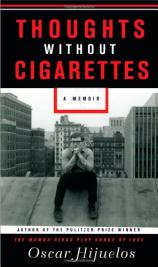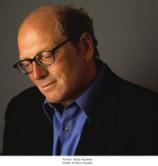Excerpt
Excerpt
Thoughts Without Cigarettes: A Memoir

CHAPTER 1
When I Was Still Cuban
Pretend it's sometime in 1955 or 1956 and that you are hanging over the roof's edge of my building, as I often did as a teenager, looking down at the street some six stories below. You would have seen, on certain mornings, my mother, Magdalena, formerly of Holguín, Cuba, and now a resident of the "United Stays," pacing back and forth fitfully before our stoop, waiting for a car. She would have been eye-catching, even lovely, with her striking dark features and pretty face, her expression, however, somewhat gaunt. Muttering to herself, she would have had the jitters, not only from her inherently high-strung nature but also because she'd probably spent the night sitting up with my pop worrying about their youngest son—me.
As green and white transit buses came forlornly chugging up the hill along Amsterdam from 125th Street, she would have stood there, perhaps with my older brother, José, by her side, watching the avenue for a car to turn onto the street, all the while dreading what the day might hold for her. Sometimes it would have rained or it would have been brutally cold. Sometimes it would be sunny, or snow would be falling so daintily everywhere around her. She might call out to a friend to come down from one of the buildings nearby, say my godmother, Carmen, mi madrina, a red-haired cubana, with her flamenco dancer's face and intense dark eyes. Coming down in a bathrobe and slippers to reassure her, she'd tell my mother not to worry so much, it wasn't good for her after all—the kid would be fine. "Ojalá," my mother, her stomach in knots, would answer, though always shaking her head.
A car would finally pull over to the curb. The driver, a friend of my father's, or someone he had paid, would take her either to 125th Street and Lenox Avenue, where she might catch a train, or directly up to Greenwich, Connecticut, where I, her five-year-old son, lay languishing in a hospital. Through the Bronx and over to the highway north to Connecticut they would go and, coming to that placid town, the kind of place she'd never have visited otherwise, enter a different world. In the spring, she'd ride along the loveliest of shadow-dappled streets, the sunlight shimmering through the leafy boughs of elm and oak trees overhead, as if they were passing through a corridor like one of the roads out of Havana; and in the winter, snow, in plump drifts and brilliant, would have been everywhere, so Christmas-y and postcard-pretty. After following her directions, which she would have recited carefully to the driver from a piece of paper—torn out of a composition notebook page or from a brown grocery bag—they would have found the hospital along King Street, off in its own meadow and reached by a winding flagstone driveway, the Byram Woods looming as a lovely view just nearby.
Each time she'd have to bring someone along to help her out with the nurses and staff. My mother had to. For what English she knew, even after some thirteen years in this country, consisted of only a few phrases and words, and even those were pronounced with her strong Cuban accent and the trepidations of a woman who, until then, had rarely ventured out from the insular immigrant's bubble of our household. It's possible that one of the Zabalas sisters, three school-teacherly cubanas living over on 111th Street, who all spoke good English, accompanied her. Or perhaps my brother or my godfather, Horacio, a bank teller, went along. Still, even with that help, just to navigate the hospital's bureaucracy must have been a misery for her—and not only because she had to depend on someone to translate her exchanges with the ward personnel but because of her fears about what she might be told. In those days, the disease I suffered from, nephritis, or nee-free-tees, as she'd pronounce it, which is now easily treatable with a broad spectrum of drugs, was then often fatal to children. That thought alone must have kept her awake on many nights, and particularly so during the first six months of my stay, when, as a safeguard against my catching other infections, I wasn't allowed to see anyone at all.
As an aside, I will tell you that for years I didn't even know the hospital's name: A kind of chronic disinformation has always been a part of my family's life, and if I have only recently learned that institution's name, it's because, in tandem with this writing, I happened to mention to my brother how strange it was that, for all the times I had asked my mother about just where I had stayed, she never seemed able to come up with a name except to say, "fue allá en Connecticut." He knew it, however, and it makes sense that this riddle, which would plague me for decades, would have a far less mysterious solution than I could have ever imagined: for that place turned out to be called, quite simply, the St. Luke's Convalescent Hospital.
A cousin, circa 1928, of its New York City namesake, where I had been taken first, the St. Luke's Convalescent Hospital consisted of a red-brick three-story structure with a white portico entranceway, and two adjacent, somewhat lower wings at either side. In the quaintness of its architecture, it suggested, from a distance, perhaps a plantation manor house. (This I know less from memory than from a postcard I recently saw of the place.) Somewhere inside the ward in which I stayed, with its locked doors and high windows, its smells of both medicine and Lysol, and its hums of pumping dialysis machines that gave off breathing sounds from down the hall, one found the visitors' room, whose main feature was a glass partition that had a speaking grille. A nurse would bring me in from the ward, where a dozen other beds both emptied and filled with children monthly, and there behind that visitors' room partition, eyes blinking, I would sit, while my mother, the nice-looking lady on the other side, no doubt tried to make friendly conversation with the five-year-old boy, her son, the delicate-looking little blond with the bloated limbs, who, as the months passed, seemed to remember her less and less.
Of course, she was my mother, I knew that—she kept telling me so—"Soy tu mamá!" But she also seemed a stranger, and all the more so whenever she started to speak Spanish, a language which, as time went by, sounded both familiar and oddly strange to me. I surely understood what she was saying (I always would); her words seemed to have something to do with our apartment on West 118th Street, con tu papá y tu hermano, and, yes, Cuba, that beautiful wonderland, so far away, of love and magic, which I had visited not so long before. Facing me, she'd raise the pitch of her voice, arch her eyebrows as if I would hear her better. She'd wipe a smear of lipstick onto a Kleenex from her black purse, muttering under her breath. I remember nodding at her words; I remember understanding my mother when she said, "Mira aquí!" ("Look what I have!") as she reached into her bag for a little ten-cent toy; and "Sabes que eres mi hijo?" ("Do you know that you're my son?") and things like "Pero, por qué estás tan callado?" ("Why are you so quiet?") and "Y que té pasa?" ("What's wrong with you?")
What happened to be wrong with me came down to the fact that I never answered my mother in the language she most wanted to hear, el español. I just couldn't remember the words, and this must have truly perplexed her, for I've been told that, before I went into the hospital, I spoke Spanish as cheerfully and capaciously as any four-year-old Cuban boy. I certainly didn't know much English before then. Maybe I'd picked up some from the neighbors in our building or from my brother, José, who, seven years older than I, attended the local Catholic grammar school and, like any kid, hung out on the streets; but, in our household, Spanish, as far as I can remember, was the rule.
Thoughts Without Cigarettes: A Memoir
- Genres: Nonfiction
- hardcover: 384 pages
- Publisher: Gotham
- ISBN-10: 1592406297
- ISBN-13: 9781592406296




